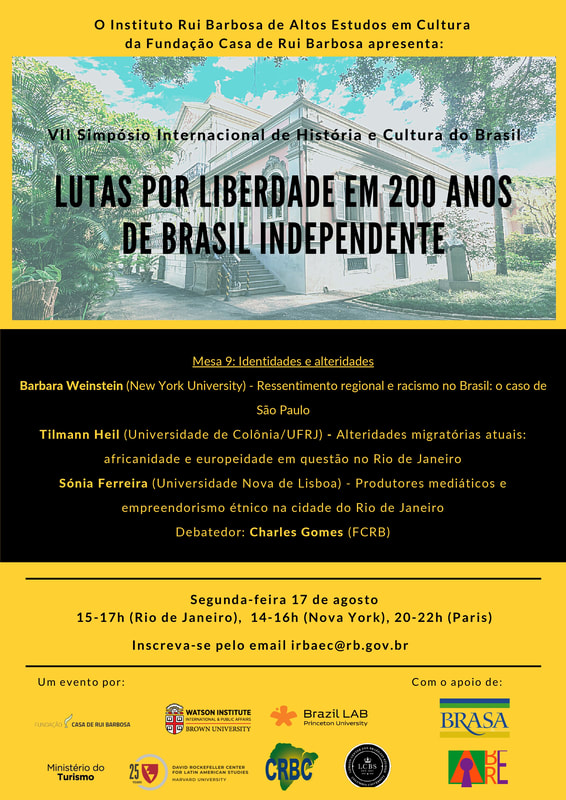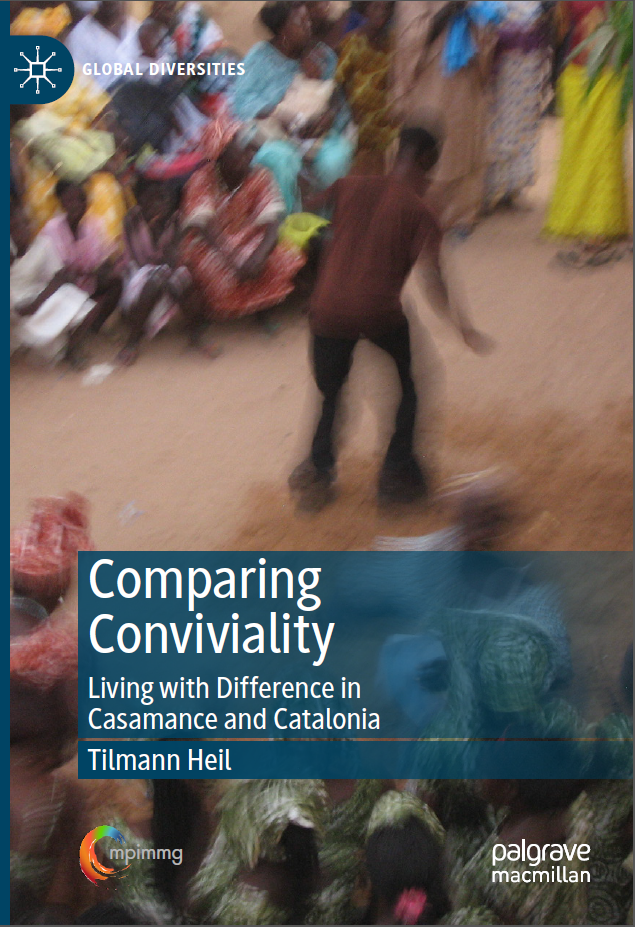|
I will be presenting at the 9th roundtable on "Identities and Alterities" of this international symposium that honors the struggles for freedom in 200 years of an independent Brazil. I will discuss some of the current alterities in Brazli that arise from the recent arrival of West Africans and Southern Europeans in the city of Rio de Janeiro. I will discuss notions of Africanness and Europeanness in my interlocutors' narratives and experiences in Rio de Janeiro and how this discussion facilitates an understanding of some of the complexities of historically grown, currently active social hierarchies and racism in the city. Missed it? Please go and listen to our debate here!
We invite you to submit a proposal to our panel
Application deadline extended: 1st of June 2020 Abstract: Cities are cross-roads where the numerous effects of neoliberal capitalism and (post)modern biopolitics converge with scores of counter-movements challenging them and proposing alternatives. In this context we ask how urban dwellers and traversers who strive for change of the terms of urban life become involved in the political. This panel aims to understand such emerging urban political subjectivities. We invite papers that observe such changes either regarding a specific subset of urban populations (e.g. activists, migrants, believers, students, homeless), specific causes (e.g. mobility, housing, security), or in overall urban governance schemes (e.g. private-public partnerships, participatory processes). The panel is particularly interested in innovative takes on the political that study the entanglements of materialities, people, and acts. We invite critical engagements with the - in our view - problematic conceptual distinctions between the political, the ethical, and the emotional. A key concern of ours is: How do non-hegemonic cosmovisions shape urban political subjectivities and how do their proponents re-define both the content and form of the political. Not only urban assemblages are plural, but also their styles and forms of addressing the political, fluently re-entangling materialities, actors, and acts. This fluidity challenges simple concepts of the political and signals urban becoming in multiplicity. Urban political subjectivities hence may go through rapid changes. Through increased analytical ethnographic attention into such emerging configurations and their synergies, tensions, and contradictions, the panel aims to make a valuable contribution to understanding and shaping more sustainable and resilient urban futures. Conference: IUAES Congress 2020 Coming of Age on Earth: Legacies and Next Generation Anthropology When: 07-11 October 2020 Where: Convention Centre, Šibenik, Croatia Conveners: Tilmann Heil (KU Leuven), Raúl Acosta (LMU Munich) Guidelines: https://iuaes2020.conventuscredo.hr/abstract-submission-guidelines/ Submission system: https://iuaes2020.conventuscredo.hr/abstract-submission/ We are looking forward to receiving your abstracts. in Migration Studies [Open Access]
with Fran Meissner Abstract In light of current experiences with migration-driven diversification, is it still conducive to think about the effects of international migration by advocating for immigrant integration? This article argues that there are key problems with European uses of immigrant integration logics that cannot be resolved through redefinitions or reappropriations of the term. Even highly refined notions of immigrant integration misconstrue the role and relevance of differences in diversity dynamics. Immigrant integration further risks concealing and perpetuating power dynamics and (colonial) hierarchies. These continue to shape the social relevance of differences. Analytically thinking about superdiversity directs us to paying more attention to disintegration, a notion that cannot be reduced and measured by way of individual or group performance. To be able to usefully engage with disintegration, we argue that it needs to be divorced from ideas about social fragmentation and social collapse. To do this, we draw on recent developments in the literature on conviviality to emphasise the relational practices, power asymmetries, and materialities that enter into negotiations of difference. Convivial disintegration aptly addresses continuously reconfiguring and uncertain social environments. Our article thus provides a deromanticised and enabling provocation for easing integration anxieties.
Science and Culture in current-day BrazilI wake up to the news that the National Museum in Rio de Janeiro is burned down. One of the most important collections gone, one of the best libraries for Social and Cultural Anthropology gone, the archives of various former professors gone, the space where people researched, learned, discussed, tried to understand the former, present and future lives of people in Brazil and beyond gone, a historical monument marking key points of the Brazilian history gone, and most importantly one more place gone in which everybody could learn about the past and present of this country, become informed citizens, engage with the current devastating, worrying, sincerely frightening political, economic and social situation of Brazil - GONE. I came to Rio de Janeiro first hosted by the Universidade Estadual do Rio de Janeiro (UERJ) and then the National Museum of the Universidade Federal of Rio de Janeiro (UFRJ). Even the world heard in the past news on the castigation that the UERJ went through as the first place that offered evening classes for students who had to work and quotas to combat structural discrimination. But even one of the most elite places, which has become more democratic in recent years with a more diversified student and professorial body, had fallen into neglect over the past years having to stay closed at various points because of the lack of funding even for the most basic services, let alone a much needed reform. Now the flames had it. What can be recovered won't be much. It is a devastating and frightening coincidence - if you believe it is - that all of this happens at a time when there does not seem much interest in public education, or rather, where the interest much rather seems to be to keep the masses ignorant again to even better exploit them. This is how it feels in Brazil these days. Being far, I cannot follow the call of my colleague Maria Elvira Díaz Benítez to go there in the morning to rescue what is left, nor can I stand by my adviser Luiz Fernando Dias Duarte who has found very clear words identifying the root causes of this desaster (https://www.theguardian.com/…/fire-engulfs-brazil-national-…), nor join the efforts of the amazing stuff of the Biblioteca Francisca Keller - PPGAS, nor take to the streets with my fellows of the PPGAS. As I did when the Rectoria of the Federal University burned down a couple of years ago, where the library of the Interdisciplinary Nucleus of Migration Studies was housed and of which I am a member (NIEM), I can only be as supportive as possible from far. I hope that Institutions of Education worldwide will do the same in rebuilding a unreplaceable loss instead of accepting a void soon to be taken by the destructive forces of our time.
|



 RSS Feed
RSS Feed